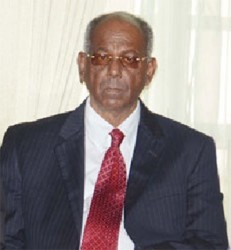Former Speaker of the National Assembly, Ralph Ramkarran and columnist, Anand Goolsarran have chided Finance Minister, Winston Jordan for his attack on Auditor General (AG) Deodat Sharma and his report on the public accounts for 2015.
At an October 17 press conference, Jordan assailed Sharma on several points including on the question of contingency spending. Sharma was of the view that the government had abused the Contingency Fund. Jordan’s riposte was that the Auditor General was in no position to decide on exigencies.
“The law gives the minister the sole right to determine exigencies and soon thereafter bring it to Parliament. He does not have to consult the AG. He consults the Cabinet. It is the Minister of Finance who determines and you can’t come six months after and tell me that the motor car I bought, for example, was not an emergency. You don’t know the circumstances and I’m the only one you can ask to explain,” Jordan declared at the press conference.
In his accountability column in the October 24 edition of Stabroek News, Goolsarran, a former long-serving Auditor General, chastised Jordan for the attack on Sharma describing it as “harsh and brutal.” Goolsarran said it reminded him of the treatment he suffered from the Jagdeo administration over the “Dolphin Scam” which precipitated his departure from the Audit Office in December 2004.



“By any stretch of imagination, such an outburst from the minister was uncalled for since the Auditor General was merely discharging his constitutional responsibilities in relation to the audit of the public accounts and reporting the results to the Legislature via the Speaker. He did not go public on his report, and it was the media that had access to the report once it was laid in the National Assembly,” Goolsarran, who was succeeded by Sharma, said.
Goolsarran described as “extraordinary” Jordan’s statements that with respect to the Contingency Fund that the Auditor General’s views do not count in law and that the law gives him (the minister) the sole right to determine exigencies.
Goolsarran stated, “While the minister is the sole authority for making the judgement as to what constitutes an urgent, unavoidable and unforeseen circumstance that warrants access to the Fund, that judgement must be exercised in a responsible matter. It cannot be at variance with what a reasonable person considers to be an emergency. One would not expect that the minister would access the Fund in circumstances where Parliament can meet to approve of additional funds in the form of a supplementary estimate. Even if Parliament is in recess, it can be recalled to approve of additional funds, if a need arises.
“It is against this background that the comments of the Auditor General must be viewed. It is a fact that the minister accessed the Contingencies Fund without ensuring that all the criteria for the grant of advances were met. It is also a fact that the advances were made to meet routine expenditure. Since the restoration of public accountability in 1992, successive Ministers of Finance have abused the use of the Contingencies Fund with impunity, as it was a more convenient and expedient proposition to access the Fund whenever there was a shortfall in expenditure rather than going back to Parliament to seek supplementary estimates, thereby avoiding any debates as to the justification for additional funding. So why not use the money from the Contingencies Fund, and sometime later request Parliament to give its covering approval to replenish the Fund, in the full knowledge that hardly any questions would be asked, as the money has already been spent!”
Goolsarran also took Jordan to task over his comments about the Auditor General’s observations on the public debt.
“The Auditor General has made certain observations in relation to the Public Debt. He is entitled to do so as part of the audit of the Statement of the Public Debt duly signed by the Minister and submitted to the Auditor General. Whether his observations are accurate is another matter which is normally dealt with and resolved at the level of the Accountant General. It is wrong to suggest that the Auditor General has no right to comment on the Public Debt. It is also equally wrong for the Auditor General not to go through a rigorous procedure to gain acceptance of his findings and recommendations as well as to incorporate in his report the explanations provided.
“I have had cause to comment on previous occasions that, while timeliness is desirable, the Auditor General must not sacrifice quality and comprehensiveness of his review to meet the deadline of 30 September in the hope of earning plaudits. It is difficult to imagine that, with a staffing of about 200 comprising mainly junior officers and a weak senior management team, the onerous task of auditing the public accounts and the accounts of ministries/departments/regions can be accomplished within this timeframe. It is therefore not surprising that many of the Auditor General’s findings are being challenged,” Goolsarran stated.
On the question of budgetary matters, Goolsarran argued that it was wrong of Jordan to suggest that Sharma was “dabbling in those areas.” Goolsarran said that the Auditor General would be delinquent in his responsibilities in not telling Parliament how the money it has approved has been spent. Citing a series of budget-related statements that were submitted to the Auditor General for auditing, Goolsarran queried, “Does the Minister expect the Auditor General to give `a blank cheque’ in relation to these statements?”
Edited
Adverting to Jordan’s statement that the Auditor General’s report was in the past edited by the Ministry of Finance before being presented to the public, Goolsarran said that apart from being untrue, it would suggest a fundamental lack of understanding of the audit process.
“How can there be a situation where the external auditors’ report is subject to editing by the client? Would that not impact adversely on the independence of the external audit function? More specifically, would it not be a violation of the International Standards on Auditing?… When we restarted the process in 1992, there was never, I repeat never, a time when the Auditor General’s report was edited by the Ministry of Finance,” Goolsarran declared.
In his column in the last Sunday Stabroek, Ramkarran, a two-term Speaker of the National Assembly, noted that the Auditor General is required by the Constitution to audit the public accounts of Guyana, which includes the Contingencies Fund, and is not subject to the direction or control of any person.
“If the Auditor General is not to be confined to being a mere bookkeeper, he (or she) might discover that the Minister has dipped into the Contingencies Fund to buy a car, to use the Minister’s analogy, which was not ‘urgent, unavoidable and unforeseen,’ even if the National Assembly approves it. Should the Auditor General then act only as the bookkeeper, ensure that the car was competitively sourced, that the invoice and the expenditure correspond and then remain silent? Or should he or she interpret his or her constitutional mandate of auditing the public accounts to mean more than ‘bookkeeping’? If so, this would oblige him or her to examine the use of the Contingencies Fund to ascertain whether such use complies with the statutory requirements of being for ‘urgent, unavoidable or unforeseen’ purposes.
“Where in the world would a constitutionally mandated Auditor General consider himself or herself to be so statutorily circumscribed that he or she would preclude himself or herself from giving an opinion on the use or misuse of a fund that he or she is required to audit? Or go even further and assume the jurisdiction to monitor adherence to the Act?” Ramkarran asked.
Ramkarran noted that there are institutional recourses that are available to the Minister if he disagrees with the Auditor General. The Minister has the opportunity of having the issue raised in the Public Accounts Committee of Parliament and even having the National Assembly pronounce on the matter. Ramkarran said that the Auditor General may take note, but his master is not the National Assembly, but the Constitution, as interpreted by the courts, for good reason.
The Minister can also apply to the court for Writs of Certiorari and Prohibition, Ramkarran posited. This will require the court to determine whether the Auditor General exceeded his powers. If it comes to the conclusion that he did, it will grant the Writs. The effect would be to quash the Auditor General’s decision and prohibit him from doing it again, he said.





